Номер 57, страница 248 - гдз по английскому языку 8 класс учебник Афанасьева, Михеева
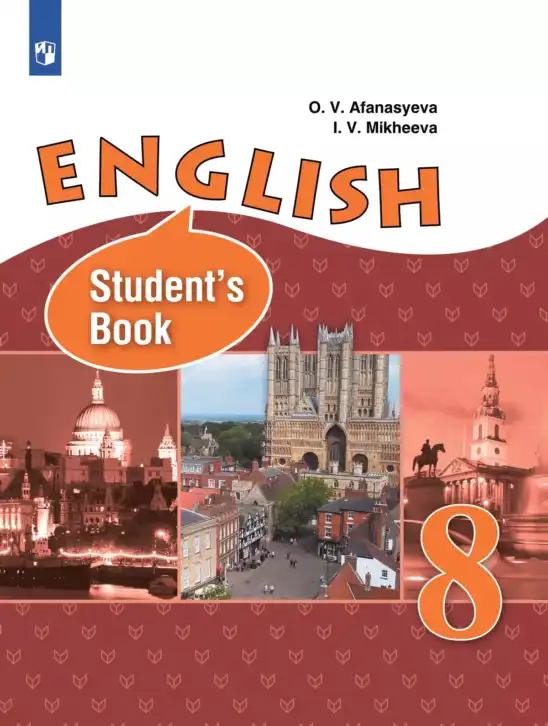
Авторы: Афанасьева О. В., Михеева И. В.
Тип: Учебник
Издательство: Просвещение
Год издания: 2014 - 2025
Уровень обучения: углублённый
Цвет обложки: белый
ISBN: 978-5-09-034201-8
Допущено Министерством просвещения Российской Федерации
Популярные ГДЗ в 8 классе
Unit 6. Newspapers and Television: The World of Mass Media. Reading for Discussion: «How I Became a Writer» (After R. Dahl) - номер 57, страница 248.
№57 (с. 248)
Условие. №57 (с. 248)
скриншот условия
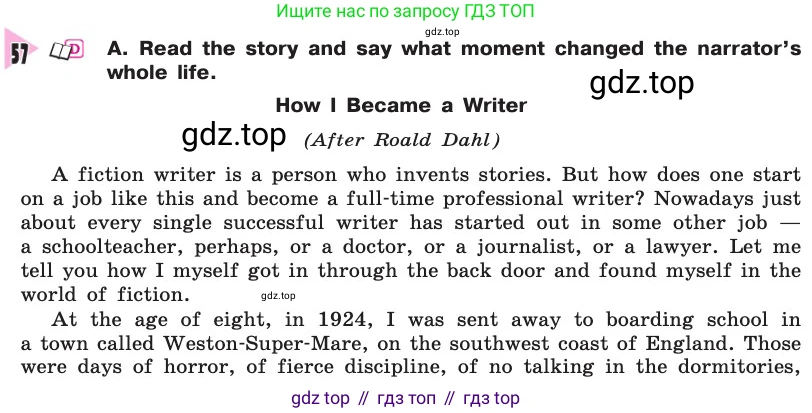
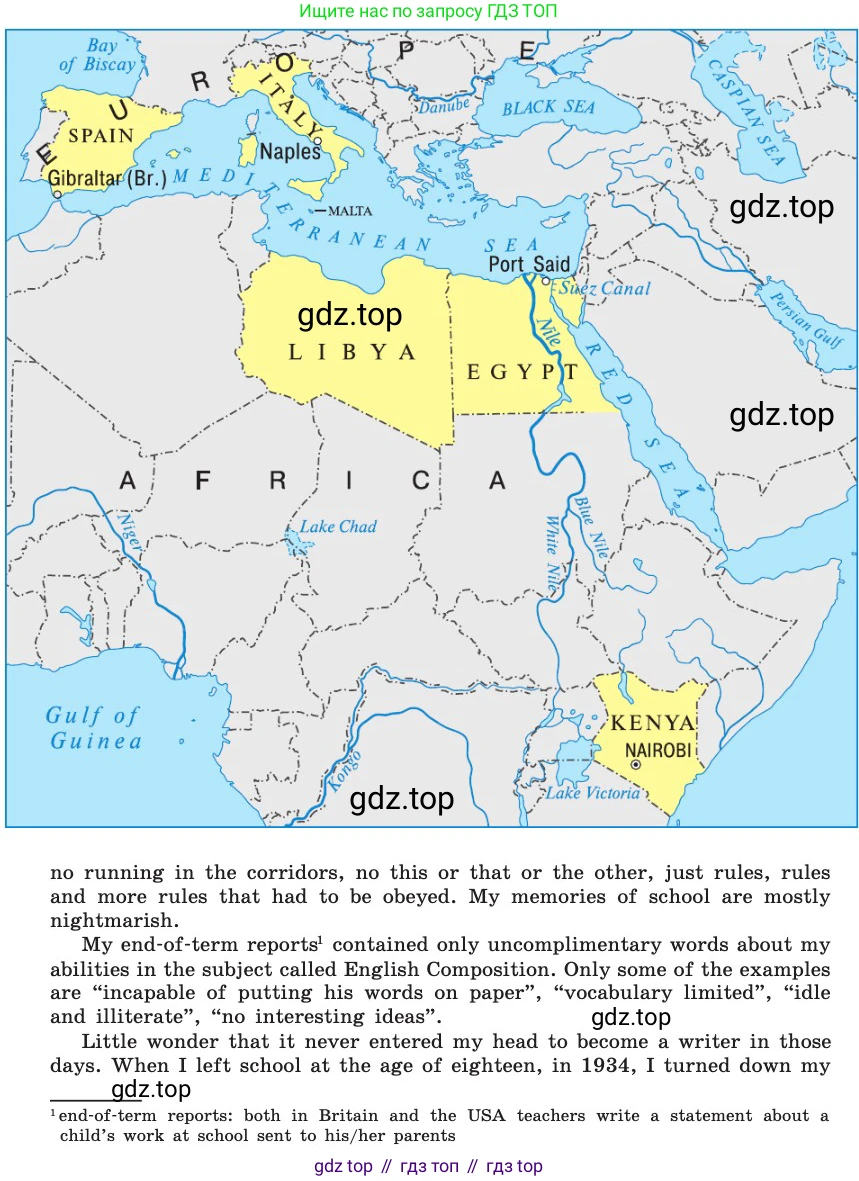
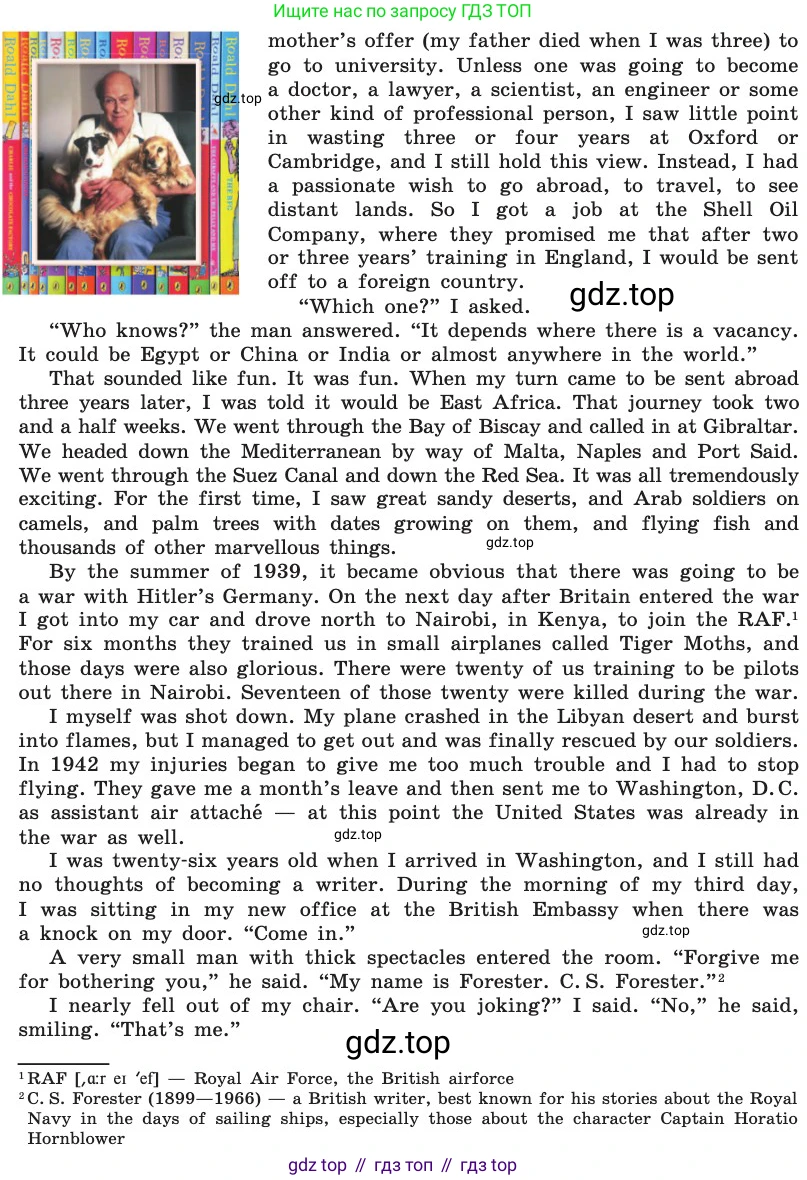
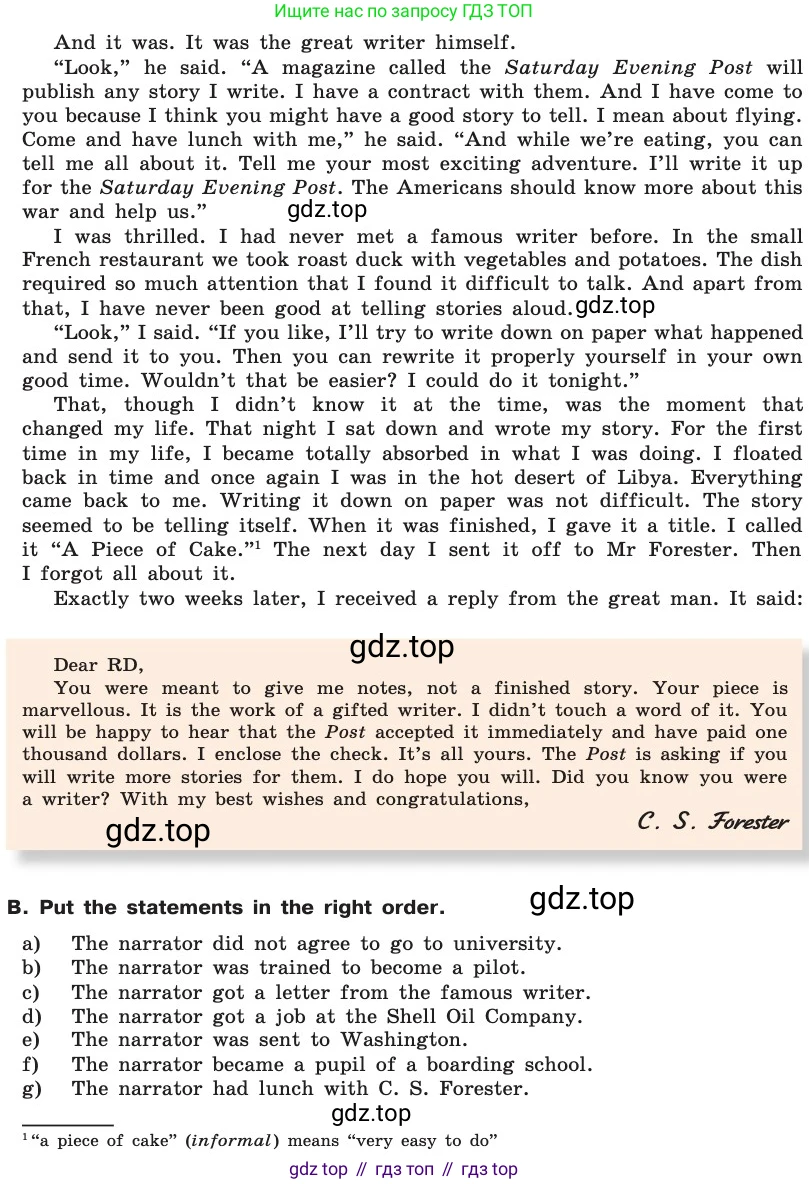
57 A. Read the story and say what moment changed the narrator's whole life.
How I Became a Writer
(After Roald Dahl)
A fiction writer is a person who invents stories. But how does one start on a job like this and become a full-time professional writer? Nowadays just about every single successful writer has started out in some other job — a schoolteacher, perhaps, or a doctor, or a journalist, or a lawyer. Let me tell you how I myself got in through the back door and found myself in the world of fiction.
At the age of eight, in 1924, I was sent away to boarding school in Weston-Super-Mare, on the southwest coast of England. Those were days of horror, of fierce discipline, of no talking in the dormitories, no running in the corridors, no this or that or the other, just rules, rules and more rules that had to be obeyed. My memories of school are mostly nightmarish.
My end-of-term reports1 contained only uncomplimentary words about my abilities in the subject called English Composition. Only some of the examples are “incapable of putting his words on paper”, “vocabulary limited”, “idle and illiterate”, “no interesting ideas”.
Little wonder that it never entered my head to become a writer in those days. When I left school at the age of eighteen, in 1934, I turned down my mother’s offer (my father died when I was three) to go to university. Unless one was going to become a doctor, a lawyer, a scientist, an engineer or some other kind of professional person, I saw little point in wasting three or four years at Oxford or Cambridge, and I still hold this view. Instead, I had a great wish to go abroad, to travel, to see distant lands. So I got a job at the Shell Oil Company, where they promised me that after two or three years’ training in England, I would be sent off to a foreign country.
“Which one?” I asked.
“It depends where there is a vacancy. It could be Egypt or China or India or almost anywhere in the world.”
That sounded like fun. It was fun. When my turn came to be sent abroad, it was to East Africa. That journey took two and a half weeks. We went through the Bay of Biscay and called in at Gibraltar. We headed down the Mediterranean by way of Malta, Naples and Port Said. We went through the Suez Canal and down the Red Sea. It was all tremendously exciting. For the first time, I saw great sandy deserts, and Arab soldiers on camels, and palm trees with dates growing on them, and flying fish and thousands of other marvellous things.
By the summer of 1939, it became obvious that there was going to be a war with Hitler’s Germany. On the next day after Britain entered the war I got into my car and drove north to Nairobi, in Kenya, to join the RAF.1 For six months they trained us in small airplanes called Tiger Moths, and there were twenty of us training to be pilots. Those days were also glorious. There were twenty of us who were killed during the war. I myself was shot down. My plane crashed in the Libyan desert and burst into flames, but I managed to get out and was finally rescued by our soldiers. In 1942 my injuries began to give me too much trouble and I had to stop flying. They gave me a month’s leave and then sent me to Washington, D. C. as assistant air attaché – at this point the United States was already in the war as well.
I was twenty-six years old when I arrived in Washington, and I still had no thoughts of becoming a writer. During the morning of my third day, I was sitting in my new office at the British Embassy when there was a knock on my door. “Come in.”
A very small man with thick spectacles entered the room. “Forgive me for bothering you,” he said. “My name is Forester. C. S. Forester.2”
I nearly fell out of my chair. “Are you joking?” I said. “No,” he said, smiling. “That’s me.”
1RAF [ɑ:r εr ‘εf] — Royal Air Force, the British airforce
2C. S. Forester (1899–1966) — a British writer, best known for his stories about the Royal Navy in the days of sailing ships, especially those about the character Captain Horatio Hornblower
And it was. It was the great writer himself.
“Look,” he said. “A magazine called the Saturday Evening Post will publish any story I write. I have a contract with them. And I have come to you because I think you might have a good story to tell. I mean about flying. And while we’re eating, you can tell me all about it. Tell me your most exciting adventure. I’ll write it up for the Saturday Evening Post. The Americans should know more about this war and help us.”
I was thrilled. I had never met a famous writer before. In the small French restaurant we took roast duck with vegetables and potatoes. The dish required so much attention that I found that, I have never been good at telling stories aloud.
“Look,” I said. “If you like, I’ll try to write down on paper what happened and send it to you. Then you can rewrite it properly yourself in your own good time. Wouldn’t that be easier? I could do it tonight.”
That, though I didn’t know it at the time, was the moment that changed my life. That night I sat down and wrote my story. For the first time in my life, I became totally absorbed in what I was doing. I floated in the hot desert of Libya. Everything flowed on to the paper. The story was not difficult. The story was finished. I gave it a title. I called it “A Piece of Cake.”1 The next day I sent it off to Mr Forester. Then I forgot all about it.
Exactly two weeks later, I received a reply from the great man. It said:
Dear RD,
You were meant to give me notes, not a finished story. Your piece is marvellous. It is the work of a gifted writer. I didn’t touch a word of it. You will be happy to hear that the Post accepted it immediately and have paid one thousand dollars. I enclose the check. It’s all yours. The Post is asking if you will write more stories for them. I do hope you will. Did you know you were a writer? With my best wishes and congratulations,
C. S. Forester
B. Put the statements in the right order.
a) The narrator did not agree to go to university.
b) The narrator was trained to become a pilot.
c) The narrator got a letter from the famous writer.
d) The narrator got a job at the Shell Oil Company.
e) The narrator was sent to Washington.
f) The narrator became a pupil of a boarding school.
g) The narrator had lunch with C. S. Forester.
1“a piece of cake” (informal) means “very easy to do”
Решение. №57 (с. 248)


Решение 2. №57 (с. 248)
A. Прочитайте рассказ и скажите, какой момент изменил всю жизнь рассказчика.
Ответ: The moment that changed the narrator's whole life was when he decided to write down his story for C. S. Forester instead of telling it. This led to the discovery of his writing talent, the publication of his first story, and the start of his career as a writer. (Момент, изменивший всю жизнь рассказчика, наступил, когда он решил записать свою историю для К. С. Форестера, а не рассказать ее. Это привело к открытию его писательского таланта, публикации его первого рассказа и началу его карьеры писателя.)
B. Расположите утверждения в правильном порядке.
Ответ: The correct order is: f, a, d, b, e, g, c. (Правильный порядок: f, a, d, b, e, g, c.)
Другие задания:
Помогло решение? Оставьте отзыв в комментариях ниже.
Присоединяйтесь к Телеграм-группе @top_gdz
ПрисоединитьсяМы подготовили для вас ответ c подробным объяснением домашего задания по английскому языку за 8 класс, для упражнения номер 57 расположенного на странице 248 к учебнику 2014 года издания для учащихся школ и гимназий.
Теперь на нашем сайте ГДЗ.ТОП вы всегда легко и бесплатно найдёте условие с правильным ответом на вопрос «Как решить ДЗ» и «Как сделать» задание по английскому языку к упражнению №57 (с. 248), авторов: Афанасьева (Ольга Васильевна), Михеева (Ирина Владимировна), углублённый уровень обучения учебного пособия издательства Просвещение.
















